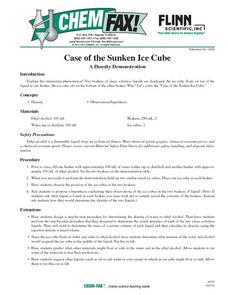Virginia Department of Education
Matter and Energy: Equations and Formulas
Using simple materials, an informative lesson demonstrates the Law of Conservation of Matter and explains how to balance chemical equations. Young chemists perform experiments, analyze reactions, and balance chemical equations on their...
Curated OER
The Influence of Carbon Dioxide on the Chemistry of Soda
Students investigate the carbon dioxide content of different sodas. In this chemistry lesson plan, students explain why PET containers are preferable than HDPE for soda bottles. They collect data and graph them.
Curated OER
Chemistry Module
High schoolers build metal atomic models using styrofoam. For this chemistry lesson, students identify the different unique properties of metals. They explain how metal atoms bond.
Teach Engineering
Density and Miscibility
The liquids did not mix — so what do density columns have to do with it? The seventh part in a series of nine provides the theoretical explanation of why density columns do not mix. The lesson covers the topics related to mixing and...
Curated OER
Substances And Chemical Reactions
Students watch and predict chemical reactions when different substances are mixed together. They differentiate between solid, liquid, and gas.
Virginia Department of Education
Predicting Products and Writing Equations
A chemistry lesson plan presents 14 chemical reactions for scholars to observe, write the equation, and balance the equations. Additionally, it provides ways to extend the activity as it relates to catalysts.
Curated OER
Polymers
Students explore online tutorial on polymers. In this chemistry lesson, they create two polymers in the lab and compare their properties. They write a sales letter about their new and improved polymer product.
Curated OER
Candy Reaction
In this triboluminescence worksheet, young scholars use wint-o-green Lifesavers to observe a chemical reaction that gives off light. They break a lifesaver up with a hammer and make observations and they chew a lifesaver and make...
Curated OER
Tie Dye
Students practice writing research proposals to test the color fastness of a dye once it has been exposed to a t-shirt. Each proposal needs details of experimental design, length of treatment, and means of cleaning the shirt. All...
Curated OER
Chemical Reactions
In this reactions worksheet, students state the differences between a coefficient and subscript and an exothermic and endothermic reaction. Students review the different types of reactions. This worksheet has 13 short answer questions.
Global Change
The Carbon Cycle and its Role in Climate Change
So how does the carbon cycle work? Kids participate in a hands-on activity that allows them to understand the chemistry behind climate change and global warming. They act out the process of photosynthesis by labeling themselves as...
Curated OER
Activity #4 What Do Equations Mean?
Students practice with writing and balancing simple chemcial equations. they comprehend that chemical equations are a method of using a set of univeral symbols to represent what happens experimentally in chemical reactions. Pupils...
Curated OER
A Date With Chemistry
Students research certain elements and then analyze their potential bonds with other elements in a dating game where the dating pool is comprised of the elements featured on the Periodic Table.
American Chemical Society
Energy Levels, Electrons, and Ionic Boding
Learners see how electrons are transferred in the bonding of NaCl. They then create models of NaCl using styrofoam balls and toothpicks to assist them in explaining the formation of ions and ionic bonding.
Curated OER
Elements of Chemistry: Compounds And Reactions
Learners identify substances and discover common substances and their chemical composition. In this chemistry lesson students write a description of the substances and how they are used.
Curated OER
Chemistry: The Case of the Sunken Ice Cube
Young scholars examine a density demonstration involving ice cubes and beakers of water and alcohol. After observing how one ice cube floats in water and sinks in alcohol, they determine which mixture of the two would suspend the ice...
Curated OER
Balancing Chemical Equations
Ninth graders explain how atoms and molecules form different substances during chemical reactions and how these processes require losing, gaining or sharing electrons. They correctly write chemical formulas and show how a balanced...
Curated OER
Ionic Chemical Formulas Days 1 & 2
Students study polyatomic ions and write binary and ternary ionic chemical formulas. They explore putting together different monatomic ions and coming up with as many chemical formulas as possible. They play a game similar to memory...
Curated OER
Chemical Reactions
Students work in groups to define chemistry vocabulary including the terms reactants, products, exothermic and endothermic. They then combine the group definitions to arrive at a consensus definition for the class. Students also listen...
Curated OER
Activity #13 Changing The Look of Sugar
Students observe what happens when sugar is dissolved in water and when it is heated. They weigh the products after each of the two experiments on a balance scale. Pupils distinguish between physical and chemical changes. Students are...
Curated OER
Bouncing Balls
Students create a polymer ball in the lab. In this chemistry lesson, students identify the different properties of the polymer they created. They explain what type of chemical reaction took place.
Curated OER
Hybridization
In this chemical compounds worksheet, students draw the Lewis structure and "cloud" structures for given compounds. Then students match the Lewis structure with the correct cloud diagrams. This worksheet has 2 problems to solve.
Curated OER
Activity #9 Tye Green Blob
Students comprehend that a chemcial change produce substances with a different composition and physical and chemcial properties. They state the differences between physical and chemical changes. Pupils observe changes that occur during...
Curated OER
Carbon Dioxide
Students conduct a series of experiments to explore carbon dioxide properties. In this chemistry lesson plan, students explain the production and uses of this gas. They measure its amount in soda and waste product of yeast.

























